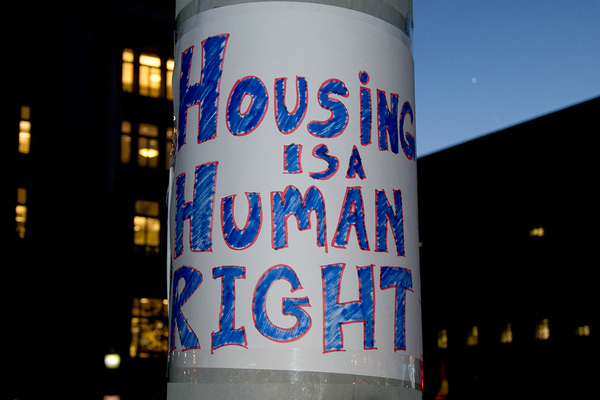In an emergency, our capacity to care for each other supersedes any economic system.
For thousands across the islands, May rent has come due, and many have come up short. The pandemic exacerbated a well-known housing crisis.
Though employment prior to the pandemic was at an all time high, 48% of residents were already struggling, often just two paychecks away from houselessness. This precarity has been compounded by the pandemic, with state unemployment highest in the nation at 37%.
Many in the unemployed workforce will have no job to return to. There are many variables to consider and discuss. What must be beyond discussion is that housing is a human right, and in an emergency, our capacity to care for each other supersedes any economic system.
The first line of response, unemployment insurance, remains inaccessible to most. This shifts some blame upon the state, which now bears the responsibility to step in to stabilize both local communities and the housing market.
Gratefully, Hawaii has been progressive among states in providing protection for renters. Hawaii’s eviction moratorium extends legal protections for renters, and introduces the possibility of criminal sanctions for landlords that violate it.
The proclamation makes any violation a misdemeanor, with the possibility of jail time. Prosecution when court processes resume seems unlikely. In any case, the point is not to jail landlords, but to keep people housed.
The once radical concept of a rent and mortgage moratorium has shifted from the fringes of political advocacy to a logical necessity.
Be Bold, Gov. Ige
Federal legislation for universal rent and mortgage payment cancellation was introduced by Rep. Ilhan Omar (D-MN), but remains unlikely to pass. Presently, more than 60% of mortgages, those that are federally backed, are eligible for relief in the form of forbearance.
However, with no mandate for landlords to extend this relief to renters, many are still on the hook for their largest monthly expense. Similarly, private mortgages are still due for many.
In the absence of federal protections, states and county responses have varied: Los Angeles renters have one year to repay missed rent, and New York state has made an appeal to the benevolence of banks and outlined guidance for regulated and exempt mortgage servicers.
The Department of Hawaiian Home Lands is providing block grants to its beneficiaries, and instituted a process to review and authorize requests to defer payments. As a reaction to the disproportionate effect the crisis is having on native Hawaiians, and indigenous peoples across the United States, it is welcome good news.
We urge Governor Ige to follow DHHL’s creative leadership. The situation requires Hawaii to be bold. Without federal guidance, the state must act. Here are prospective measures:
- extend the eviction moratorium for at least 90 days past the emergency proclamations;
- create a rent recuperation fund, which allows renters to register and file their inability to pay, with landlords responsible for filing to recuperate costs;
- create a state mortgage relief fund for homeowners to cover private mortgage payment shortfalls;
- use CARES Act federal funding and state rainy day funds to work with local banks to establish these temporary funds; and
- suspend the precedent of balancing the state budget. Tax revenues will be significantly depleted, but the state should refuse austerity measures that have been shown to hurt working families.
These measures have many embedded variables to consider and discuss, but in an emergency, the simplest and most direct measures may be most effective.
In humanitarian assistance, direct cash payments are a demonstrated, effective means to deliver aid. The federal government’s Coronavirus Tax Relief Economic Impact Payments, are one example.
Further economic relief is needed to help working families facing the question of daily bread versus monthly roof overhead. Routing federal funds into state-administered direct cash payments streamlines administrative requirements of addressing these needs of working families.
Arguing for state governmental intervention that involves thousands of property owners and renters is radical. But across Hawaii, thousands of working families are relying on solidarity, persistence, and innovation to navigate a radically changed world. Government, in light of an unprecedented crisis, must do the same.
Outside of further government support, island renters are left with the uncertainty of seeking rent abatements from their landlords or face post-moratorium evictions. For tenant resources, including sample abatement request letters, visit Honolulu Tenants Union, or to share your story of paying rent in the pandemic, visit Hawaii Strategy Lab.
Source: civilbeat





